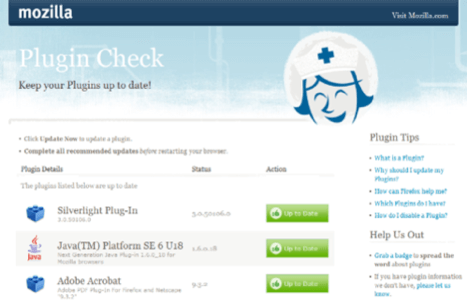Mozilla, the organization behind the Firefox web browser, introduced a “plugin checker” page last fall that analyzed whether the plugins you had installed in your web browser were up to date. Now that tool has been updated to check plugins installed in other web browsers too, including Safari, Chrome, Opera and Internet Explorer.

According to the Director of Firefox Development, Johnathan Nightingale, plugin safety is an issue across the web. “Outdated plugins are a major source of security and stability risk for web users,” he wrote in a recent company blog post.
Plugin Safety Matters
Nightingale says that some studies have shown that the number of users running outdated plugins in their web browser is as high as 80%. However, the plugin checking mechanism built into the latest builds of the Firefox web browser keeps its users better secured as it will prompt you to update your plugins when new ones become available. He notes that over 60% of Firefox users visiting the plugin checker page were running the most recent version of the Adobe Flash plugin, a plugin that’s a popular target for attackers looking to exploit security vulnerabilities in the browser. When including users with either the latest version of the Flash plugin or the second most recent, the number was 75%, much higher than the rest of the web as a whole.
Beyond Firefox: Plugin Safety for All Browsers
But plugin safety isn’t just an issue for Firefox users. All web surfers who use plugins can be affected by security issues. And most do have plugins, even if they don’t realize it.
Mainstream users may not understand that clicking “install Flash” to watch a web video means they’ve installed a browser plugin, but that’s exactly what they just did. And now in Google Chrome, the new web browser from the Internet Search giant, the Adobe Flash plugin will come pre-installed with the browser itself.
To help address the issues of plugin safety outside the Firefox ecosystem, Mozilla has updated their plugin safety page to work with a number of other web browsers, including Safari 4, Chrome 4 and Opera 10.5. It also checks the safety levels of the most popular plugins for Internet Explorer 7 and 8.

If you’re using a non-Firefox browser such as those listed above, you can visit this Mozilla webpage and have your plugins checked for you. If any of the plugins are old, just click the “Update Now” button to remedy the situation. If the plugin checker can’t determine the status of the plugin, a “Research” button will appear instead. Plugins that are current will show a green “Up to Date” button.
Reminder Badges
Web site owners who want to remind their visitors to check their plugins can add one of these quirky banners to their site. “Groom parrot, Polish trophies, Check plugins,” the banner reads.

Although the plugin checker page is a handy tool for web surfers concerned about security, it’s better when the browser does it for you. Our online lives are busy enough, we don’t need to add another to-do item to our list.

















